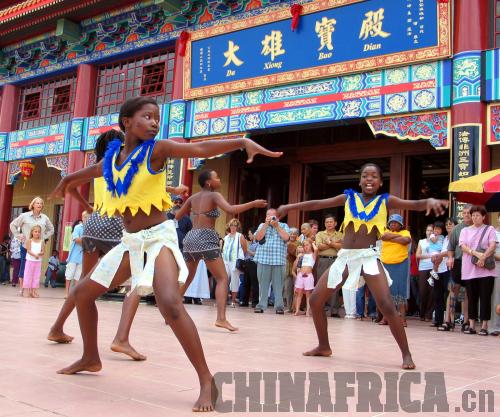|
 |
|
CROSS CULTURE: Dancers perform at a Chinese Buddhist temple in Johannesburg |
China and Africa share a friendship that goes back to the early 1950s, steeped in past struggles for national liberation and the battle for independence. Forged by economic and trade cooperation in the 1980s, through to the launch of the Forum on China-Africa Cooperation (FOCAC) in 2000, a platform and mechanism established to strengthen cooperation, the relationship has reached a critical phase. Role players are now asking whether mutual understanding between China and Africa is enough to sustain the relationship going forward.
To help find answers to this question, African scholars attending the First China-Africa Think Tanks Forum (CATTF) suggested that Chinese companies should learn more about African culture, while Chinese working in Africa should interact more with the locals.
The first CATTF meeting was held in Hangzhou City, Zhejiang Province between October 27 and 29. Over 300 well-known scholars, senior government officials, entrepreneurs from China and 27 African countries, African regional organizations and other think tanks, attended. Most participants felt that China-Africa cooperation lags behind in people-to-people, cultural and think-tank areas. A lack of understanding comes from both sides. Yet, those areas are important to deepen Sino-African relations.
Improve understanding
Africa has been developing and has gone through the transformation of political ideas such as democratization and civil society said He Wenping, Director of Institute of West-Asian and African Studies of the Chinese Academy of Social Sciences.
"We need to understand the political and ideological changes in Africa, their changes of perspective and the political power layout in Africa," said He. She said that Africa is composed of more than 50 different countries, which share similarities but also have differences in political and social structures. Understanding all these changes is the prerequisite for China pushing the relationship with Africa forward, she added.
According to Ebrima Sall, Executive Secretary of the Council for the Development of Social Science Research in Africa (CODESRIA), at a conference organized by CODESRIA in Nairobi, Kenya in March this year, one of the participants, Professor Mohamed Salih, presented a review of the growing body of literature on China-Africa relations, and made the revelation that of 900 more or less recent publications, only 7 percent were produced in Africa. The rest (93 percent) were produced outside of Africa, and primarily by non-Africans. "The knowledge about China that exists in Africa is very limited. The forum gives us a good opportunity for exchanges," Sall told ChinAfrica.
For people who report on China-Africa relations, their ideas seem more practical. "It's the first time I have visited China and didn't know much about this country [before this visit]. But I'm interested in learning everything about it. I want to know how the Chinese are working and living, how China is developing its economy, and how African countries can learn from China's experiences," said Ekpdofassi Sabin Loumejinon, Editor in Chief of Benin's La Nation newspaper, who came to China to report on the event.
Liu Hao, Deputy Director General of the International Cooperation Department of the China Development Bank, has worked on projects in Africa for nine years and visited 35 African countries. But he feels he still doesn't know much about Africa and would like to know more. "China should learn more about Africa, including African systems of government, laws, culture and languages. In my opinion, the bottleneck and challenges facing our future cooperation is our mutual understanding, efficiency, and African countries' infrastructure, especially the transportation facilities," Liu explained.
Liu hopes that more African scholars come to China to learn about the country. "China has 1.4 billion people, while Africa has 1 billion. Our people-to-people exchanges should go hand-in-hand with political and economic cooperation to support the healthy development of China-Africa relations," he said.
|